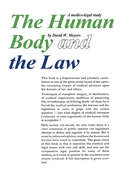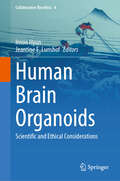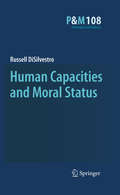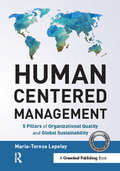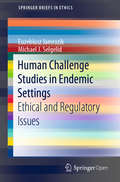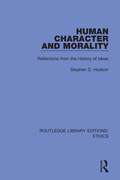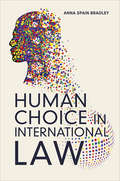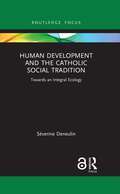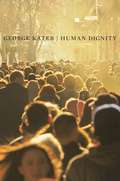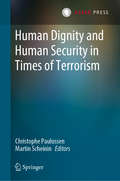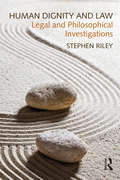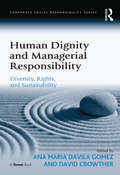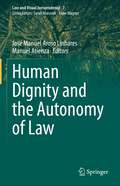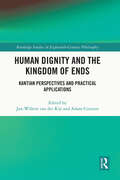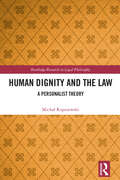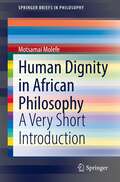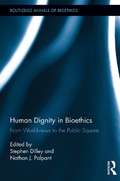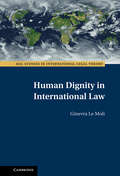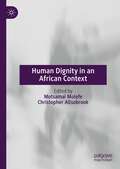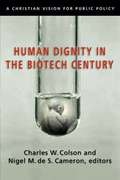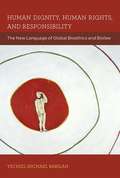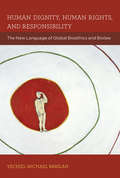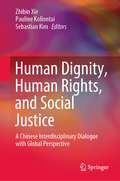- Table View
- List View
Human Body and the Law: A Medico-legal Study (Edinburgh Law And Society Ser.)
by Robert Maynard HutchinsIn this admirably objective and lucid exposition, the author examines from a medico-legal standpoint the comparative position in various countries, particularly in the UK and the USA, of currently controversial medical procedures: voluntary sterilisation, compulsory sterilisation and castration, trans-sexualism, experimentation, transplantation, and euthanasia - few of which, if any, enjoy a settled or clearly defined place in the eyes of the law. He considers the problems from two perspectives: first, that of the individual in society and how far he himself may determine the extent of physical intrusion on his body; secondly, that of the state or society and how far it may impose or limit medical intrusion on the human body. Thus, Mr. Meyers provides a valuable account, not only of current medical attitudes, but also of relevant case and statute law as it stands at present.It is inherent in the nature of this book that it should arouse controversy and argument. There are many important questions to be debated: Has the state the right to enforce its conception of morality without showing that the behaviour it proscribes has a harmful effect on other members of society? To what extent does consent by the individual concerned insulate a surgeon from criminal liability? In connection with compulsory sterilisation, who is to judge those unfit to procreate? What is a proper definition of medical experimentation? What constitutes death? If a man has a right to live has he not an equal right to die?These are a few of the issues raised. The author has not hesitated to express his own opinions but has clearly relegated them to the summary at the end of each chapter, thereby leaving the objectivity of his main text unimpaired.David W. Meyers is a practicing lawyer in California, with American and British legal qualifications at the firm of Dickenson, Peatman & Fogarty. He has taught at the University of Edinburgh Law School and the University of Tasmania Law School as well as
Human Brain Organoids: Scientific and Ethical Considerations (Collaborative Bioethics #4)
by Insoo Hyun Jeantine E. LunshofBrain organoids are small stem cell-derived, self-organizing models of specific brain regions that offer researchers new ways to study the human brain. Since their scientific debut over ten years ago, brain organoids have been used to generate tractable new bioengineered tools for understanding functional interconnectivity of the human brain, dysfunction involved in many neurodegenerative diseases, and certain molecular mechanisms underlying cognition. Despite this field’s considerable scientific promise, advances in human brain organoid research also raise novel philosophical questions and ethical concerns around the use of complex human brain models and the ethical boundaries that should exist when manipulating increasingly realistic bioengineered brain constructs. As researchers generate more realistic organoids in vitro that resemble human brains, it is critically important to understand what ethical boundaries may exist and where researchers and regulators should draw the line for research, both to reduce uncertainties over which projects to pursue in the lab and to address future concerns regulators and the public may harbor about whether this research, if left unexamined, could inadvertently undermine public trust in science. This proposed book delves into ongoing and proactive ethical discussions among ethicists and the neuroscientists involved with this cutting-edge work. Its ultimate goal is to foster greater awareness, understanding, and guidance for future management of ethical issues that may be unique to new areas of brain organoid research. This volume is the result of a close partnership between ethicists and scientists, each informing the other through a collaborative process of joint bioethical deliberation.
Human Capacities and Moral Status
by Russell DisilvestroMany debates about the moral status of things--for example, debates about the natural rights of human fetuses or nonhuman animals--eventually migrate towards a discussion of the capacities of the things in question--for example, their capacities to feel pain, think, or love. Yet the move towards capacities is often controversial: if a human's capacities are the basis of its moral status, how could a human having lesser capacities than you and I have the same "serious" moral status as you and I? This book answers this question by arguing that if something is human, it has a set of typical human capacities; that if something has a set of typical human capacities, it has serious moral status; and thus all human beings have the same sort of serious moral status as you and I. Beginning from what our common intuitions tell us about situations involving "temporary incapacitation"--where a human organism has, then loses, then regains a certain capacity--this book argues for substantive conclusions regarding human fetuses and embryos, humans in a permanent vegetative state, humans suffering from brain diseases, and humans born with genetic disorders. Since these conclusions must have some impact on our ongoing moral and political debates about the proper treatment of such humans, this book will be useful to professionals and students in philosophy, bioethics, law, medicine, and public policy.
Human Centered Management: 5 Pillars of Organizational Quality and Global Sustainability (Human Centered Management)
by Maria-Teresa LepeleyWe have never had more freedom to acquire information to make decisions, and organizations have never been so pressed to demonstrate accountability as they communicate with better informed customers and users. People who work IN an organization must also work FOR the organization to accomplish its mission. In this environment, humans are no longer just a resource; they are the reason an organization exists. New constructs are needed to ensure this human-centered paradigm shift.This book sets out the rationale for this shift and stimulates the discussion and the discovery of effective approaches and solutions to innovate for social and environmental good. Written by an expert in quality standards, the book offers a coherent model which synchronizes the organizational structure with the talent required to develop resilient and agile work environments. New strategies to develop talent will be critical, and multidisciplinary approaches from scholars and practitioners from around the world will be required to effectively collaborate and articulate the solutions. The proposition in the book focuses on continuous improvement and interdisciplinary collaboration between scholars and practitioners across different industries, sectors, and national borders in order to address the unavoidable disruptions in the global VUCA environment.
Human Challenge Studies in Endemic Settings: Ethical and Regulatory Issues (SpringerBriefs in Ethics)
by Michael J. Selgelid Euzebiusz JamrozikThis open access book provides an extensive review of ethical and regulatory issues related to human infection challenge studies, with a particular focus on the expansion of this type of research into endemic settings and/or low- and middle-income countries (LMICs). Human challenge studies (HCS) involve the intentional infection of research participants, and this type of research is rapidly increasing in frequency worldwide. HCS are widely considered to be an especially promising approach to vaccine development, including for pathogens endemic to LMICs. However, challenge studies are sometimes controversial and raise complex ethical issues, some of which are especially salient in endemic and/or LMIC settings. Informed by qualitative interviews with experts in infectious diseases and bioethics, this book highlights areas of ethical consensus and controversy concerning this kind of research. As the first volume to focus on ethical issues associated with human challenge studies, it sets the agenda for further work in this important area of global health research; contributes to current debates in research ethics; and aims to inform regulatory policy and research practice. Insofar as it focuses on HCS in (endemic) settings where diseases are present and/or widespread, much of the analysis provided here is directly relevant to HCS involving pandemic diseases including COVID19.
Human Character and Morality: Reflections on the History of Ideas
by Stephen D. HudsonOriginally published in 1986, this book explores the animating qualities of human character and moral thought and discusses how they place constraints on the adequacy of moral theories. It evaluates some of the major theories in the history of ethics, notably the moral thoughts of Sidgwick, Kant, Aristotle and Hume. The book examines questions of fundamental importance to all of us and broadens the scope and wisdom of analytical philosophy by conveying the excitement of original philosophical research.
Human Choice in International Law
by Anna Spain BradleyHuman Choice in International Law is an exploration of human choice in international legal and political decision making. This book investigates the neurobiology of how people choose and the history of how personal choice has affected decisions about international peace and security. It charts important decision moments in international law about genocide, intervention into armed conflict and nuclear weapons at the central institutions of the international legal order. Professor Spain Bradley analyzes the role that particular individuals, serving as international judges or Security Council representatives, play in shaping decision outcomes and then applies insights from neuroscience to assert the importance of analyzing how cognitive processes such as empathy, emotion and bias can influence such decisionmakers. Drawing upon historical accounts and personal interviews, this book reveals the beauty and struggle of human influences that shape the creation and practice of international law.
Human Cloning
by Kerry Lynn MacintoshMany people think human reproductive cloning should be a crime-some states have even outlawed it and Congress is working to enact a national ban. However, if reproductive cloning soon becomes a reality, it will be impossible to prevent infertile couples and others from choosing the technology, even if they have to break the law. While most books on cloning cover the advantages and disadvantages of cloning technology, Illegal Beings describes the pros and cons of laws against human reproductive cloning. Kerry Lynn Macintosh, an attorney with expertise in the area of law and technology, argues that the most common objections to cloning are false or exaggerated, inspiring laws that stigmatize human clones as subhuman and unworthy of existence. She applies the same reasoning that was used to invalidate racial segregation to show how anti-cloning laws, by reinforcing negative stereotypes, deprive human clones of their equal protection rights under the law. Her book creates a new topic within constitutional law: existential segregation, or the practice of discriminating by preventing the existence of a disfavored group or class. This comprehensive and novel work looks at how anti-cloning laws will hurt human clones in a fresh perspective on this controversial subject. Kerry Lynn Macintosh is a member of the Law and Technology faculty at Santa Clara University School of Law. She is the author of papers, articles, and book chapters on the law and technology and has contributed to the Harvard Journal of Law and Technology, Boston University Journal of Science and Technology Law, and Berkeley Technology Law Journal.
Human Development and the Catholic Social Tradition: Towards an Integral Ecology (Routledge Research in Religion and Development)
by Séverine DeneulinThis book brings development theory and practice into dialogue with a religious tradition in order to construct a new, transdisciplinary vision of development with integral ecology at its heart. It focuses on the Catholic social tradition and its conception of integral human development, on the one hand, and on the works of economist and philosopher Amartya Sen which underpin the human development approach, on the other. The book discusses how these two perspectives can mutually enrich each other around three areas: their views on the concept and meaning of development and progress; their understanding of what it is to be human – that is, their anthropological vision; and their analysis of transformational pathways for addressing social and environmental degradation. It also examines how both human development and the Catholic social tradition can function as complementary analytical lenses and mobilizing frames for embarking on the journey of structural and personal transformation to bring all life systems, human and non-human, back into balance. This book is written for researchers and students in development studies, theology, and religious studies, as well as professional audiences in development organizations.
Human Dignity
by Aharon BarakHuman dignity is now a central feature of many modern constitutions and international documents. As a constitutional value, human dignity involves a person's free will, autonomy, and ability to write a life story within the framework of society. As a constitutional right, it gives full expression to the value of human dignity, subject to the specific demands of constitutional architecture. This analytical study of human dignity as both a constitutional value and a constitutional right adopts a legal-interpretive perspective. It explores the sources of human dignity as a legal concept, its role in constitutional documents, its content, and its scope. The analysis is augmented by examples from comparative legal experience, including chapters devoted to the role of human dignity in American, Canadian, German, South African, and Israeli constitutional law.
Human Dignity
by George KatebWe often speak of the dignity owed to a person. And dignity is a word that regularly appears in political speeches. Charters are promulgated in its name, and appeals to it are made when people all over the world struggle to achieve their rights. But what exactly is dignity? When one person physically assaults another, we feel the wrong demands immediate condemnation and legal sanction. Whereas when one person humiliates or thoughtlessly makes use of another, we recognize the wrong and hope for a remedy, but the social response is less clear. The injury itself may be hard to quantify. Given our concern with human dignity, it is odd that it has received comparatively little scrutiny. Here, George Kateb asks what human dignity is and why it matters for the claim to rights. He proposes that dignity is an “existential” value that pertains to the identity of a person as a human being. To injure or even to try to efface someone’s dignity is to treat that person as not human or less than human—as a thing or instrument or subhuman creature. Kateb does not limit the notion of dignity to individuals but extends it to the human species. The dignity of the human species rests on our uniqueness among all other species. In the book’s concluding section, he argues that despite the ravages we have inflicted on it, nature would be worse off without humanity. The supremely fitting task of humanity can be seen as a “stewardship” of nature. This secular defense of human dignity—the first book-length attempt of its kind—crowns the career of a distinguished political thinker.
Human Dignity and Human Security in Times of Terrorism
by Martin Scheinin Christophe PaulussenIn this book, it is explained that despite a current drop in the number of deaths, terrorism should still be considered a serious and widespread problem. However, the responses to this phenomenon are often more problematic from a long-term perspective. With the human rights framework under serious pressure, this edited volume offers a timely, important and critical in-depth analysis of human dignity and human security challenges in the lead-up, and in the responses, to current forms of terrorism. It aims to map how human dignity and human security can be secured and how law can constitute a source of trust at a time when Europe and the rest of the world continue to be plagued by terrorism.The authors are both established names and upcoming talent in this fastchanging and exciting field of law. They thoroughly analyse a variety of topical subjects, in more conceptual chapters—for example calling for the humanisation of the security discourse—and in highly practical contributions, in which for instance the Kafkaesque situation in which rendition and torture victim Abu Zubaydah still finds himself today is considered.This book, which focuses on, but is not limited to the situation in Western countries, aims to inspire not only academics—through further theorisation on the sometimes elusive but important concepts of human dignity and human security—but also practitioners working in the field of countering terrorism. It will hopefully convince them (even more) that following a human rights approach will be indispensable in securing human dignity and human security for all. Even—or in fact: especially—in times of terrorism.Christophe Paulussen is a Senior Researcher in the Research Department of the T.M.C. Asser Instituut in The Hague, The Netherlands and Martin Scheinin is Professor of International Law and Human Rights in the Department of Law of the European University Institute (EUI) in Florence, Italy.
Human Dignity and Law: Legal and Philosophical Investigations
by Stephen RileyThis book argues that human dignity and law stand in a privileged relationship with one another. Law must be understood as limited by the demands made by human dignity. Conversely, human dignity cannot be properly understood without clarifying its interaction with legal institutions and legal practices. This is not, then, a survey of the uses of human dignity in law; it is a rethinking of human dignity in relation to our principles of social governance. The result is a revisionist account of human dignity and law, one focused less on the use of human dignity in our regulations and more on its constitutive implications for the governance of the public realm.The first part conducts a wide-ranging moral, legal and political analysis of the nature and functions of human dignity. The second part applies that analysis to three fields of legal regulation: international law, transnational law, and domestic public law.The book will appeal to scholars in both philosophy and law. It will also be of interest to political theorists, particularly those working within the liberal tradition or those concerned with institutional design.
Human Dignity and Managerial Responsibility: Diversity, Rights, and Sustainability (Corporate Social Responsibility)
by Ana Maria GomezThe issue of human rights, in the context of corporate social responsibility, is normally taken to relate to concern about exploitation in the supply chain - child labour, slavery in developing countries, and similar evils; but of course, human rights are engaged in relation to the treatment of employees in any work situation. Indeed, as Human Dignity and Managerial Responsibility illustrates, the handling of employees is increasingly recognised as an important ingredient of sustainable enterprise - evidence shows that ethical and socially responsible behaviour is increasingly and successfully being engaged in many large corporations. Much has been written about the responsibilities of managers. Since employees are claimed by all organisations to be among their most important stakeholders it is ironic that research finds that the behaviour of many managers towards employees is often inappropriate. The editors and contributors of Human Dignity and Managerial Responsibility argue that there is a clear connection between maintaining the dignity of the workforce and corporate performance and sustainability. Their multiple perspectives on the workplace examine the position of the employee as a stakeholder, together with issues about managing employees in relation to social responsibility and sustainability. They discuss diversity in the broadest sense, filling a gap in the research-related literature essential to a more rounded understanding of CSR. Human Dignity and Managerial Responsibility will appeal to a wide audience amongst those with an academic or professional interest in CSR, sustainability, governance and stakeholder management, human rights, diversity, human resource management, and organisational development.
Human Dignity and the Autonomy of Law (Law and Visual Jurisprudence #7)
by Manuel Atienza José Manuel Aroso LinharesThis book intertwines two major themes in contemporary legal theory – the concepts of human dignity and the problem of the autonomy and limits of the law – while also addressing two other key aspects – the first one concerned with human rights practices and foundations (in their direct connections with the issue of dignity), the second one considering the role that the law’s aspirations attribute to the experience of an autonomous subject-person (and the demands that identify his/her position in the dialectical counterpoint with the rethinking of a community). The diversity of perspectives that each of these themes allows is explored in various contexts and with unmistakable implications concerning juridical validity, rule of law practices, pluralism, political and practical-cultural challenges, and divisive “bio-ethical” issues. This means considering the separation or separability theses between law and morality and the juridically relevant experience of person(hood) as a dialectic between autonomy and responsibility, the orthodox and heterodox images of comparable concreteness and incomparable singularity, the challenges of external points of view and interdisciplinary approaches.
Human Dignity and the Kingdom of Ends: Kantian Perspectives and Practical Applications (Routledge Studies in Eighteenth-Century Philosophy)
by Adam Cureton Jan-Willem van der RijtThis book advances our understanding of the nature, grounds and limits of human dignity by connecting it with Kant’s notion of an ideal moral community, or "Kingdom of Ends". It features original essays by leading Kant scholars and moral and political philosophers from around the world. Although Kant’s influential injunction to treat humanity as an end in itself and never merely as a means has garnered the most attention among those interested in analyzing human dignity with a Kantian lens, Kant himself places much more emphasis on the Kingdom of Ends as crucial for defining human dignity. The chapters in this collection focus not only on interpretive issues related to the Kingdom of Ends but also on practical applications that have the potential to advance discussions about the nature and foundations of rights, the content of moral principles, the importance of moral ideals and attitudes and the nature of moral motivation. Exploring and connecting the ideas of human dignity and the Kingdom of Ends significantly deepens our moral understanding, advances discussions in moral and political philosophy and enhances our appreciation of Kant’s moral theory. Human Dignity and the Kingdom of Ends: Kantian Perspectives and Practical Applications will appeal to scholars and advanced students of Kant, moral philosophy, political philosophy, and political theory.
Human Dignity and the Law: A Personalist Theory (Routledge Research in Legal Philosophy)
by Michał RupniewskiThis book reassesses the relationship between human dignity, law, and specifically the ‘personalist’ school of agency. The work argues that a specific way of appreciating dignity is contained in how law understands the person, and so can be used to improve upon how we explain and interpret the law. Despite considerable differences between jurisdictions as regards human dignity in application, it is argued that the particular weight of human persons is the widely shared focal point. The central claim, therefore, is that the law recognises, and tries to foster, the status of personhood, and, drawing on the work of Karol Wojtyła, the author develops a ‘Status of Personhood Theory’. The book will be of interest to academics and researchers working in the areas of Legal Philosophy, Jurisprudence, Philosophy, Ethics and Political Theory.
Human Dignity in African Philosophy: A Very Short Introduction (SpringerBriefs in Philosophy)
by Motsamai MolefeThis book throws a spotlight on the under-explored African perspective on the mercurial concept of human dignity. To do so, it employs two strategies. In the first instance, it considers African theories of human dignity: (1) vitality; (2) community; (3) Personhood. Secondly, it explores the plausibility of these theories by applying them to select applied ethics themes, specifically: animal ethics, disability ethics and euthanasia. The aim of this book is not to argue for the plausibility of these African theories, but to familiarize the global audience of philosophy, ethics and related disciplines (legal studies, sociology, bioethics and so on) with a neglected African perspective on this vital concept. The books is aimed at scholars of philosophy interested in non-European and specifically African perspective.
Human Dignity in Bioethics: From Worldviews to the Public Square (Routledge Annals of Bioethics)
by Stephen Dilley Nathan J. PalpantHuman Dignity in Bioethics brings together a collection of essays that rigorously examine the concept of human dignity from its metaphysical foundations to its polemical deployment in bioethical controversies. The volume falls into three parts, beginning with meta-level perspectives and moving to concrete applications. Part 1 analyzes human dignity through a worldview lens, exploring the source and meaning of human dignity from naturalist, postmodernist, Protestant, and Catholic vantages, respectively, letting each side explain and defend its own conception. Part 2 moves from metaphysical moorings to key areas of macro-level influence: international politics, American law, and biological science. These chapters examine the legitimacy of the concept of dignity in documents by international political bodies, the role of dignity in American jurisprudence, and the implications—and challenges—for dignity posed by Darwinism. Part 3 shifts from macro-level topics to concrete applications by examining the rhetoric of human dignity in specific controversies: embryonic stem cell research, abortion, human-animal chimeras, euthanasia and palliative care, psychotropic drugs, and assisted reproductive technologies. Each chapter analyzes the rhetorical use of ‘human dignity’ by opposing camps, assessing the utility of the concept and whether a different concept or approach can be a more productive means of framing or guiding the debate.
Human Dignity in International Law (ASIL Studies in International Legal Theory)
by Ginevra Le MoliOver the past two centuries, the concept of human dignity has moved from the fringes to the centre of the international legal system. This book is the first detailed historical, theoretical and legal investigation of human dignity as a normative value, the intellectual sources that shaped its legal recognition, and the main legal instruments used to give it expression in international law. Ginevra Le Moli addresses the broad historical and philosophical developments relating to the legal expression of dignity and the doctrinal geography of human dignity in international law, with a focus on international humanitarian law, international human rights law and international criminal law. The book fills a major lacuna in the literature by providing a comprehensive account of dignity within international law that draws on an extensive documentary and archival basis and a vast body of decisions of international judicial and quasi-judicial bodies.
Human Dignity in an African Context
by Motsamai Molefe Christopher AllsobrookThis book is a contribution to African philosophy, by philosophers focusing specifically on the concept of human dignity in ethical theory. The concept of ‘human dignity’ denotes the intrinsic and superlative worth associated with human beings in virtue of which we owe them utmost moral regard. Although dignity is a foundational concept for African philosophy, there remains scant literature in African philosophy dedicated to critical and systematic reflection on the concept of human dignity. This volume responds to this lacuna by bringing together chapters that offer philosophical exposition, defense (or even rejection) and application of the concept of human dignity in light of intellectual resources in African cultures, such as ubuntu, personhood, and serithi.
Human Dignity in the Biotech Century: A Christian Vision for Public Policy
by Nigel M. de S. Cameron Charles W. ColsonWhat will be the greatest moral challenge facing our society throughout this century?Are we ready to face it?Editors Charles W. Colson and Nigel M. de S. Cameron, along with a panel of expert contributors, make the case in this book that the greatest watershed debates of the twenty-first century concerning ethics and public policy will surround the issue of biotechnology. In twelve essays they address several of the legal and ethical challenges before us: embryo research, stem cell research, cloning, genetic engineering, gene therapy, pharmacogenomics, cybernetics, nanotechnology and, of course, abortion. Contributors includeWilliam L. Saunders, J. D. , Family Research CouncilChristopher Hook, M. D. , The Mayo ClinicHenk Jochemsen, Ph. D. , Free University of AmsterdamDavid A. Prentice, Ph. D. , Indiana State UniversityNathan A. Adams IV, Ph. D. , J. D. , Christian Legal SocietyDavid Stevens, M. D. , Christian Medical AssociationPaige Comstock Cunningham, J. D. , Americans United for LifeC. Ben Mitchell, Ph. D. , Trinity Evangelical Divinity SchoolRichard Doerflinger, M. A. , Secretariat for Pro-life, National Conference of Catholic BishopsWesley J. Smith, J. D. , International Task Force on Euthanasia and Assistend SuicideLeaders in their fields, these contributors point out the crucial role Christians can and should play in the public square. The well-informed and forward-looking perspectives they present will help us prepare for the challenges ahead.
Human Dignity, Human Rights, and Responsibility
by Yechiel Michael Barilan"Human dignity" has been enshrined in international agreements and national constitutions as a fundamental human right. The World Medical Association calls on physicians to respect human dignity and to discharge their duties with dignity. And yet human dignity is a term--like love, hope, and justice--that is intuitively grasped but never clearly defined. Some ethicists and bioethicists dismiss it; other thinkers point to its use in the service of particular ideologies. In this book, Michael Barilan offers an urgently needed, nonideological, and thorough conceptual clarification of human dignity and human rights, relating these ideas to current issues in ethics, law, and bioethics. Combining social history, history of ideas, moral theology, applied ethics, and political theory, Barilan tells the story of human dignity as a background moral ethos to human rights. After setting the problem in its scholarly context, he offers a hermeneutics of the formative texts on Imago Dei; provides a philosophical explication of the value of human dignity and of vulnerability; presents a comprehensive theory of human rights from a natural, humanist perspective; explores issues of moral status; and examines the value of responsibility as a link between virtue ethics and human dignity and rights. Barilan accompanies his theoretical claim with numerous practical illustrations, linking his theory to such issues in bioethics as end-of-life care, cloning, abortion, torture, treatment of the mentally incapacitated, the right to health care, the human organ market, disability and notions of difference, and privacy, highlighting many relevant legal aspects in constitutional and humanitarian law.
Human Dignity, Human Rights, and Responsibility: The New Language of Global Bioethics and Biolaw (Basic Bioethics)
by Yechiel Michael BarilanA novel and multidisciplinary exposition and theorization of human dignity and rights, brought to bear on current issues in bioethics and biolaw.“Human dignity” has been enshrined in international agreements and national constitutions as a fundamental human right. The World Medical Association calls on physicians to respect human dignity and to discharge their duties with dignity. And yet human dignity is a term—like love, hope, and justice—that is intuitively grasped but never clearly defined. Some ethicists and bioethicists dismiss it; other thinkers point to its use in the service of particular ideologies. In this book, Michael Barilan offers an urgently needed, nonideological, and thorough conceptual clarification of human dignity and human rights, relating these ideas to current issues in ethics, law, and bioethics.Combining social history, history of ideas, moral theology, applied ethics, and political theory, Barilan tells the story of human dignity as a background moral ethos to human rights. After setting the problem in its scholarly context, he offers a hermeneutics of the formative texts on Imago Dei; provides a philosophical explication of the value of human dignity and of vulnerability; presents a comprehensive theory of human rights from a natural, humanist perspective; explores issues of moral status; and examines the value of responsibility as a link between virtue ethics and human dignity and rights.Barilan accompanies his theoretical claim with numerous practical illustrations, linking his theory to such issues in bioethics as end-of-life care, cloning, abortion, torture, treatment of the mentally incapacitated, the right to health care, the human organ market, disability and notions of difference, and privacy, highlighting many relevant legal aspects in constitutional and humanitarian law.
Human Dignity, Human Rights, and Social Justice: A Chinese Interdisciplinary Dialogue with Global Perspective
by Pauline Kollontai Sebastian Kim Zhibin XieThis book explores human dignity, human rights and social justice based on a Chinese interdisciplinary dialogue and global perspectives. In the Chinese and other global contexts today, social justice has been a significant topic among many disciplines and we believe it is an appropriate topic for philosophers, theologians, legal scholars, and social scientists to sit together, discuss, enrich each other, and then deepen our understanding of the topic. Many of them are concerned with the conjuncture between social justice, human rights, and human dignity. The questions this volume asks are: what’s the place of human rights in social justice? How is human dignity important in the discourse on human rights? And, through these inquiries, we ask further: how is possible to achieve humanist justice? This volume presents the significance, challenges, and constraints of human dignity in human rights and social justice and addresses the questions through philosophical, theological, sociological, political, and legal perspectives and these are placed in dialogue between the Chinese and other global settings. We are concerned with the norms regarding human dignity, human rights and social justice while we take seriously into account their practice. This volume consists of two main sections. The first section examines Chinese perspectives on human rights and social justice, in which both from Confucianism and Christianity are considered and the issues such as patriotism, religious freedom, petition, social protest, the rights of marginalized people, and sexual violence are studied. The second section presents the perspectives of Christian public theologians in the global contexts. They examine the influence of Christian thought and practice in the issues of human rights and social justice descriptively and prescriptively and address issues such as religious laws and rights, diaconia, majoritarianism, general equality, social-economic disparities, and climate justice from global perspectives including in the contexts of America, Australia, Israel and Europe. With contributions by experts from mainland China, Hong Kong, South Korea, Australia, New Zealand, the UK, USA and Norway, the book provides valuable cross-cultural and interdisciplinary insights and perspectives. As such it will appeal to political and religious leaders and practitioners, particularly those working in socially engaged religious and civil organizations in various geopolitical contexts, including the Korean Peninsula and Japan.
